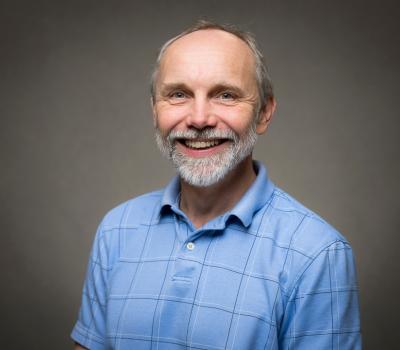
Albrecht Jander jokes that he came to the U.S. from Germany “kicking and screaming.” It was not a commentary on the move, however — he was just 1-year-old at the time.
His family settled in Lawrence, Kansas where his father is still a professor of biology. They spoke only German at home so Jander started school without speaking English, although he doesn’t recall it being difficult to adjust.
Jander says his interest in electronics started when he and his father would put together Heathkit projects — kits for making small electronic devices such as radios. “Of course the kit that I remember best was a light timer, that’s because it burst into flames the moment we plugged it in,” he says.
Academics were of primary importance when he was growing up and Jander’s father held a weekly meeting with his children to check in with them about their progress in school. For those meetings Jander also read books on electronics which his father would quiz him on. As a reward for successfully completing a chapter, his father would buy him parts for an electronic project.
He says that extra work with his father is likely what led to him getting a full scholarship to Washington University in St. Louis where he also stayed for his Masters and Ph.D. degrees.
Although Jander worked in industry for a while he always knew that he wanted to be a professor. And it is obvious he puts a priority on teaching. On the walls of his office hang various props that he uses in his classes to help students remember a lesson. For example, what looks to be a quiver with some oversized arrows is actually a demonstration of the direction of forces for electric and magnetic fields.
It was not until his final degree, though, that he switched his research to magnetic materials and electronic devices that use magnetic materials.
“Magnetism is a really exciting and a very active field. There are neat new discoveries every year that really blow your mind,” he says, pointing out that the Nobel Prize in Physics for 2007 was for work in magnetism.
He co-directs the Applied Magnetics Laboratory with Pallavi Dhagat, where they are pushing the boundaries of what can be done with magnetics. Jander says they focus on areas of magnetics that few others are working on and where they can make their mark in doing innovative advanced work. For example, one line of research on the use of acoustic waves to store and retrieve data would have an advantage over current memory devices in that it would be lower cost, more resistant to damage and more mechanically robust, since there are no moving parts.
Other applications for their work include spintronics, the use of magnetic devices to replace transistors in computer circuits, and magnetic sensors for medical, space or security purposes. They have many collaborators for their work at other universities, in industry and at national research laboratories including Army Research Labs, Cornell University, Oregon Health Sciences University and Nonvolatile Electronics Corporation. Jander even has a chance to use his German with several collaborators in Germany.
In the tradition of his father’s meetings at home, the Applied Magnetics Laboratory meets weekly and the students present to the group what they have accomplished. Jander says it’s a positive family-like atmosphere where everyone is encouraged to help each other out.

